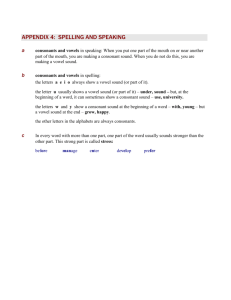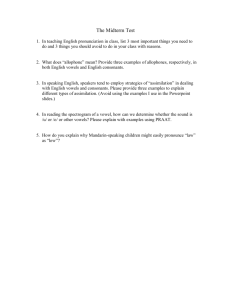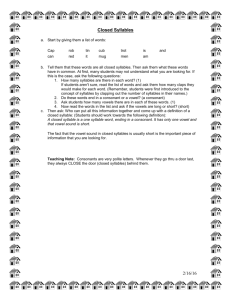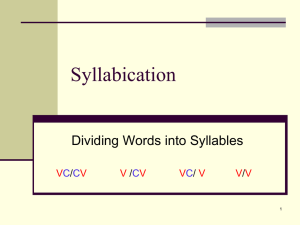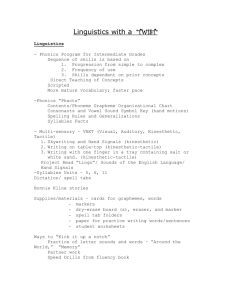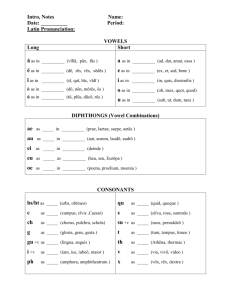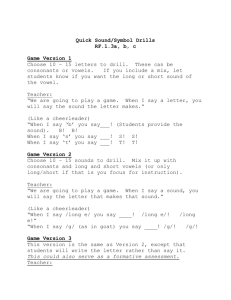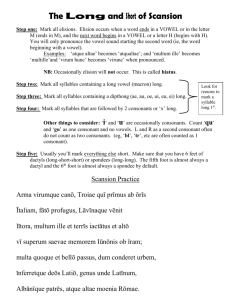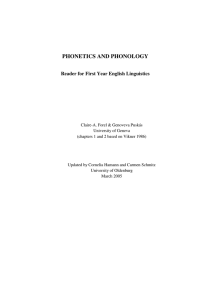Lecture 6 Presented by Margana
advertisement
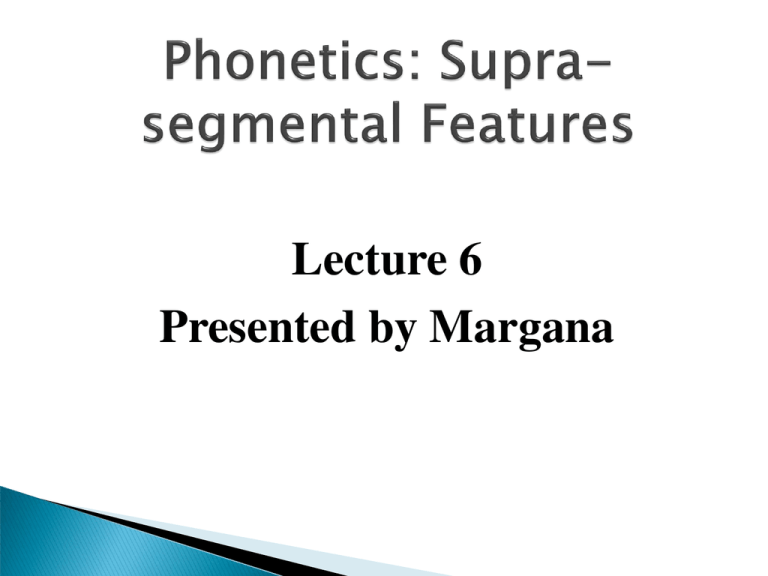
Lecture 6 Presented by Margana As mentioned earlier, there are two elements of the study of phonology. They are segmental and suprasegmental elements. The segments (i.e. individual sounds) of speech could be classified in terms of place and manner of articulation and voicing for consonants. The segments of vowels are categorised in terms of the tongue height and advancement, lip rounding, and tenseness. The characteristics of suprasegmental of speech: speech sounds may also have length, intonation, tone, and stress. The length refers to the duration of a speech sound as some speech sounds are inherently longer than others as exemflified as follows. High vowels are shorter than low vowel. Voiceless consonants are longer than voiced consonants. Voiceless fricatives are the longest consonant of all. i:, a: or α:, ō:, u: and ə: are fully long when final, e.g. when such words as si: (see), ka: (car), rō: (raw). tu: (two), fə: (fur) are said by themselves or are final in a sentence. They are also fully long when a voiced consonant follows and the syllable is final in a sentence, e.g. when such words as si:d (seed), hα:m (harm), kō:z (cause), smu:ð (smooth), bə:d (bird) are said by themselves or are final in a sentence High vowels are shorter than low vowel ◦ [ı] high front lax unrounded vowel in [bıg] is shorter than [æ] low front lax unrounded vowel [bæg] Voiceless consonants are longer than voiced consonants ◦ the sound [b] in [bıg] requires shorter distance to produce than [p] like in [pıg]. Voiceless fricatives are the longest consonant of all - [f] in [fæn] requires long distance They are less long, often not more than half-long, when weakly stressed syllables follow . In spring- board They are half-long, often not more than half-long, when weakly stressed syllables follow, e.g. i’mmediately, opp’ortunity They are half-long when a breathed consonant follows in the same syllable, e.g. in si:t (seat), hα:f (half) They are half-long, or even less than halflong, in weakly stressed positions preceding a strong stress, e.g. e’conomy, a’uthority the influence of the sounds around ◦ Compare bead, beat, and bees ◦ [i] precedes a voiced consonant in [bid] requires 1.5 times longer than the same vowel before a voiceless consonant as [i] in [bit] ◦ While [i] in [bis] is as long as [i] in [bit] ◦ Thus, the longer duration is required when producing vowel sounds preceded the voiced consonants The pattern of rises and falls in pitch across a stretch of speech such as a sentence. The pitch = highness or lowness The meaning of sentence can depend on the sentence’s intonation contour. [yu gat ən e an ə t st] [yu gat ən e an ə t ts, ə si an ə homwrk, n ə bi an ə kıwz] With respect to the syllables in a word the pitch can make a different in the word’s meaning The languages that include tone as one of the factors affecting meanings are called tone languages Chinese... It is a property of syllables, not individual segments. A stressed syllable is more prominent or easily identified than unstressed Stressed syllables are prominence due to ◦ A number of physical effort in production, ◦ Greater loudness ◦ Increased duration Unstressed syllables contains reduced vowels. A reduced vowels is one which is produced closer to the mid central position in the mouth, and which is more likely to be lax than its stressed unreduced vowels. Example: photograph vs photography compare the second vowels in the above words (as English contains primary, secondary, and tertiary stress levels) in the above example in a word like photography, the second syllable is most prominent (primary stress), the final syllable is next most prominent (secondary stress) and the other syllables are unstressed (tertiary) Study the stress in the following phrases, how does stress affect the meaning of the phrase: A bla׳ckboard vs a black bo׳ard A white ho׳use vs the whi׳te house A gree׳nhouse vs a green ho׳use Fromkin, V. et al. 1988. An Introduction to Language. London: Holt. Rinehart and Winston. Mcmahon, A. 2002. Introduction to Phonology. Edinburgh: Edinburgh University Press
